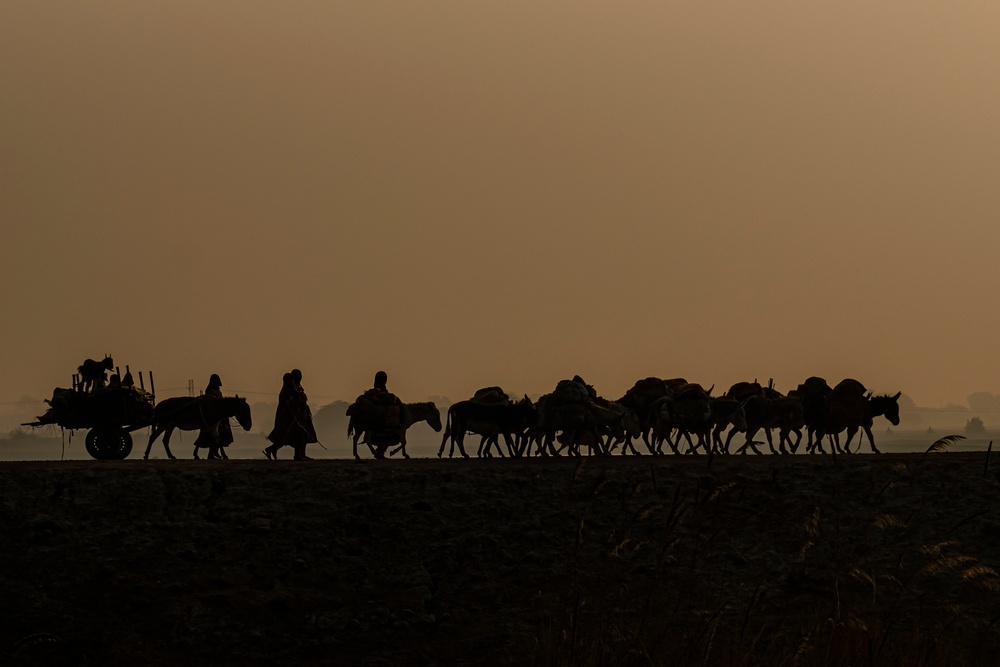
“Let the maiden to whom I say, ‘Please, lower your jar that I may drink,’ and who replies, ‘Drink, and I will also water your camels’—let her be the one whom You have decreed for Your servant Isaac. Thereby shall I know that You have dealt graciously with my master” (Breisheet 24:14). It was kindness, specifically kindness to animals that led Rebecca to be chosen as the first Jewish wife[1] and second matriarch of the Jewish people. G-d's mercy extends to all creatures and hence man must do the same[2].
It is not by chance that Avraham gave his servant 10 camels for his journey. The Hebrew word for camel is gamal and gamal is the root of the term used to describe acts of kindness, gemilut chasadim[3]. It is the camel that is the ideal desert animal, bestowing its kindness to humans by needing so few provisions. Like all kosher animals camels chew their cud; but lacking split hooves it is not kosher. It may not be kosher to eat but not having a split hoof is a great benefit and kindness to man. The cloven hoof makes it much easier to travel at relatively high speeds with great endurance on flat, open terrain. Perfect for desert travel.
The number of mitzvot the Torah devotes to the welfare of animals is astonishing, going well beyond tzaar ba’al hachaim, the prohibition of causing unnecessary pain and suffering to animals – including the prohibitions of muzzling an animal as it plows, putting a yoke on a ox and donkey together and the obligation to relieve a burden on an animal. We must feed our animals before we eat (though we may drink first – as evidenced by Rivka first offering water to the servant of Avraham), nor may one kill a mother and her offspring in the same day. The laws of slaughtering animals is meant to cause instantaneous death. One is promised long life for sending away a mother bird before taking the eggs.
The Torah prohibits cross-breading; the word leminah, to its kind, appears seven times – a most significant number, especially in regards to creation – in describing the creation of birds and animals. Each species is to produce only its own species. One may not even have an animal perform work on Shabbat – it too is entitled to a day of rest.
It is through the offering of animals that we can atone for our sins, celebrate our happy moments, offer gratitude to G-d and become closer to Him. While we may use – even kill – animals for our benefit we must at the same time ensure we not treat animals as mere property.
Fascinatingly, many major Biblical events revolve around animals. It was the snake that caused the banishment of Adam and Eve from the Garden of Eden. G-d promises Avraham that his descendants will inherit the land only after he separated from Lot. This split was caused as Lot allowed his animals to graze in lands they did not yet own. Avraham “offered a ram in place of his son” (Breisheet 22:13) and it the horn of a ram with which we beseech G-d as He sits in judgement of the human race. Yaakov was able to trick his father by wearing animal skin, and his children were able to trick Yaakov by dipping Yosef’s coast in the blood of a goat[4].
On a more positive note G-d first appeared to Moshe as he was grazing his flock “in the wilderness” thereby ensuring they would not graze on the land of others. Like humans, animals were not allowed near Mount Sinai. They too are impacted by holiness; an idea reflected in the law that a first-born animal – like a first-born person – must be redeemed.
That animals can have greater insight than man can be seen from the story of Bilam. There really is much we can learn from animals.
“Rabbi Yoḥanan said: Even if the Torah had not been given, we would have learned modesty from the cat, [the prohibition of] stealing from the ant, forbidden relations from the dove, and proper relations from the rooster, which appeases the hen and then mates with it” (Eiruvin 100b).
[1] When Abram and Sarai married, they were not yet part of the covenantal people.
[2] The women chosen, Rivka, would have to first offers drinks to people. Having mercy on animals but not humans – something we sadly see all too often today – is a actually a manifestation of cruelty.
[3] The Torah tell us that Adam “gave names to all cattle, and to the birds of the air, and to every beast of the field” (Breisheet 2:20). There is much we can learn from the names of animals.
To cite one more example. A donkey is a chamor related to chomer,material, representing the physical and material world. Avraham tells his servants to “sit here with the chamor as I and the lad will go there” (Breisheet 22: 5) to sacrifice to G-d. The Mashiach is described a “poor person riding on a donkey” (Zechariah 9:9) as the Messiah will come when man is able to channel his physical drives for spiritual pursuits.
[4] This is likely the reason that on every Jewish holiday – from Rosh Chodesh to Yom Kippur and everything in between – a sin offering of a goat must be brought on behalf of the Jewish people.
